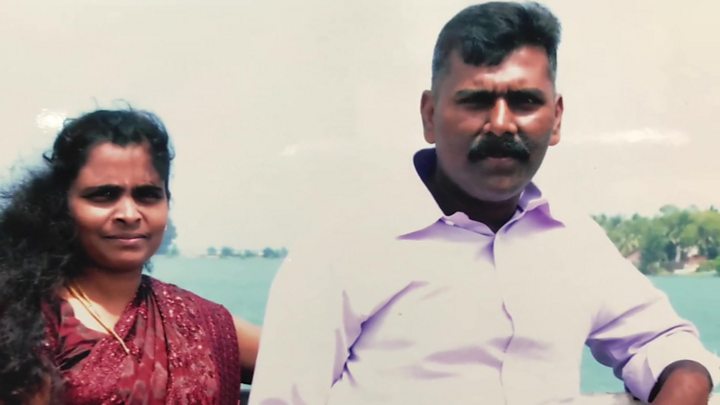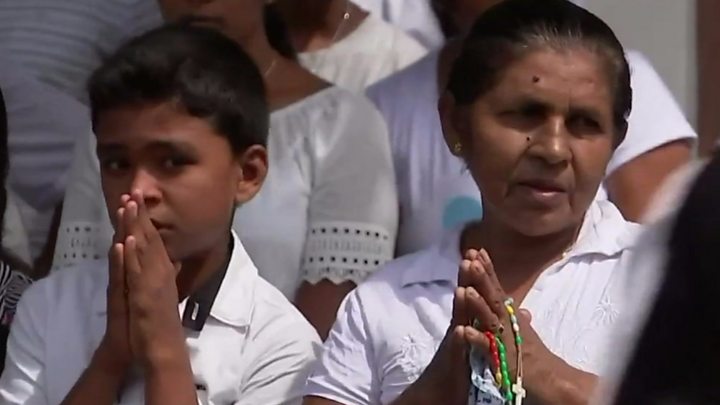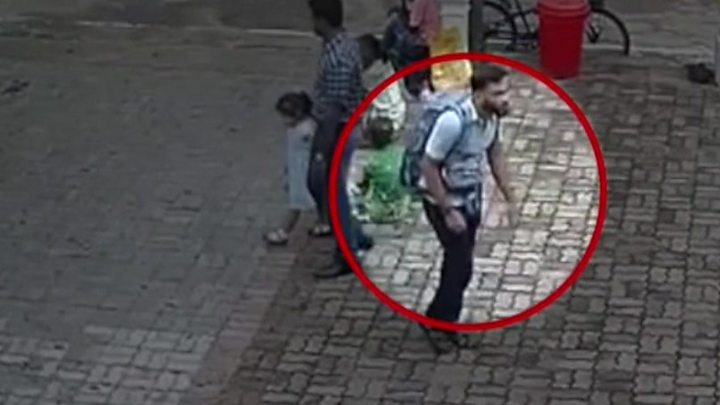Sri Lanka bomber ‘studied in UK’
One of the attackers behind the Easter Sunday bombings in Sri Lanka studied in the UK, officials say, as further details on the bombers begin to emerge.
The country’s deputy defence minister said the bomber studied in the UK before doing a course in Australia.
The announcement comes after the death toll rose again to 359 on Wednesday with more than 500 people wounded.
Prime Minister Ranil Wickremesinghe said the Islamic State (IS) group may be linked to the blasts.
IS has said it was responsible for the attacks, although it has not provided direct evidence of its involvement.
Police say they have identified eight out of nine attackers – one of whom is believed to have been a woman – with no foreigners among them.
On Wednesday, the US envoy to Sri Lanka warned that there were “ongoing terrorist plots” in the country.
“Terrorists can strike without warning,” Alaina Teplitz told reporters. “Typical venues are large gatherings [and] public spaces.”
What do we know about the attackers?
At a press conference on Wednesday, Deputy Defence Minister Ruwan Wijewardene gave more details on the suspected bombers.
“We believe that one of the suicide bombers studied in the UK and then later on did his postgraduate in Australia before coming back to settle in Sri Lanka,” he said.
Mr Wijewardene said that “most of [the attackers] are well educated and come from… middle or upper middle class” families.
“They are financially quite independent and their families are quite stable financially,” he added.
Authorities say they are looking into possible links between the locals who carried out the suicide bombings and the Islamic State group.
Sri Lanka’s government has blamed the blasts on local Islamist group National Thowheed Jamath (NTJ).
But Mr Wickremesinghe said the attacks “could not have been done just locally”.
“There had been training given and a coordination which we are not seeing earlier,” he said.
Police have now detained around 60 suspects in connection with the attack. A state of emergency remains in effect to prevent further attacks.
The nearly simultaneous attacks targeted three churches packed for Easter services and three major hotels in the capital, Colombo.
An attack on a fourth hotel on Sunday was foiled, Mr Wickremesinghe said. He also warned that further militants and explosives could still be “out there” following the attack.
The country remains tense with police still looking for suspects and possible further explosives.
Who could be behind the attacks?
IS said it had “targeted nationals of the crusader alliance [anti-IS US-led coalition] and Christians in Sri Lanka” via its Amaq news outlet.
It provided no evidence for the claim but shared an image on social media of eight men purported to be behind the attack.
The group’s last territory fell in March but even then experts had warned it does not mean the end of IS or its ideology.
Earlier, Mr Wijewardene told parliament that NTJ was linked to another radical Islamist group he named as JMI. He gave no further details.
He also said “preliminary investigations” indicated that the bombings were in retaliation for deadly attacks on mosques in Christchurch, New Zealand, in March.
NTJ has no history of large-scale attacks but came to prominence last year when it was blamed for damaging Buddhist statues. The group has not said it carried out Sunday’s bombings.
The Sri Lankan government is facing scrutiny after it emerged the authorities were warned of about a possible attack.
Security services had been monitoring the NTJ but the prime minister and the cabinet were not warned, ministers said.
Who were the victims?
The first mass funeral was held on Tuesday, as Sri Lanka marked an official day of mourning for the victims.
Most of those who died were Sri Lankan nationals, including scores of Christians attending Easter Sunday church services.
Sri Lankan officials said 38 foreign nationals were among the dead, with another 14 unaccounted for. The death toll includes at least eight British citizens and at least 11 Indian nationals.
The mass funeral for about 30 victims took place at St Sebastian’s church in Negombo, north of Colombo, which was one of the places targeted in Sunday’s blasts. Another funeral service was scheduled for later on Tuesday.
A moment of silence was also observed at 08:30 on Tuesday, reflecting the time the first of six bombs detonated.
Flags were lowered to half-mast and people, many of them in tears, bowed their heads in respect.
Source: Read Full Article





